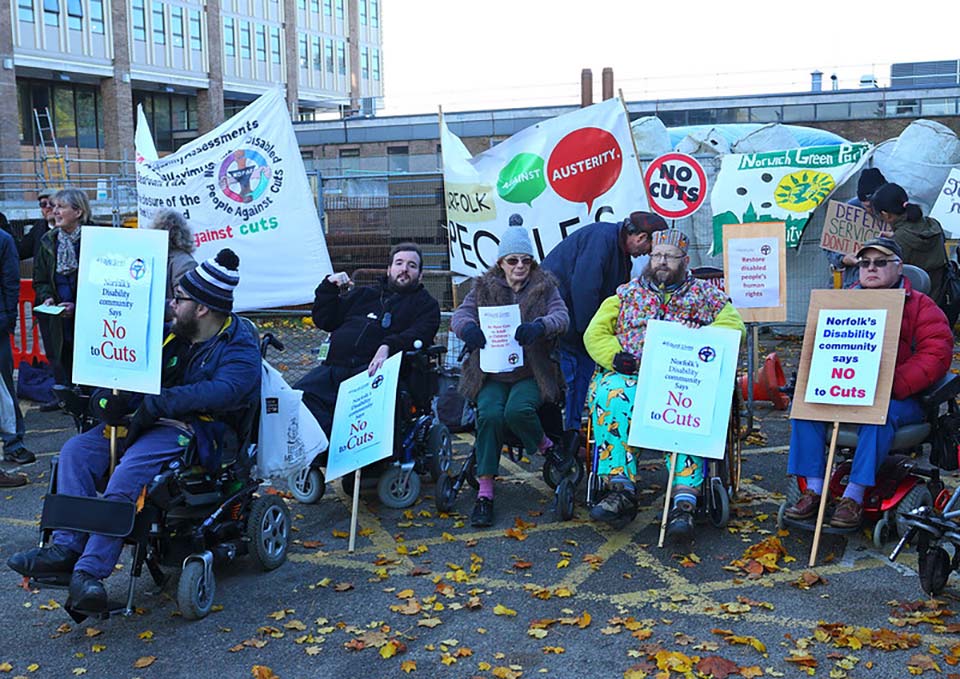When it comes to the impact of the rising cost of living, Joe Powell does not mince his words: “Any time there’s going to be a crisis, people with learning disabilities will be among the first to be affected.”
Powell, the chief executive of charity All Wales People First and a self-advocate, highlights the negative effects that years of austerity have inflicted on people with learning disabilities in the UK.
Now, with unprecedented hikes in energy, food and other bills and billions of pounds of further cuts to public spending being mooted, he worries the UK has entered “uncharted territory”, which could put even more pressure on people, their families and the system supposed to support them.

No to austerity: cuts disproportionately affect people with disabilities and those who support them – photo: Roger Blackwell/Flickr CC BY 2.0
More cuts are the opposite of what is needed, Powell argues. The social safety net is now so threadbare it is not a net at all and, if we are not careful, the mistakes of the past are about to be repeated.
Back in 2010, the warning signs were clear. The public was told in no uncertain terms to expect years of devastating cuts under the guise of economic necessity in the wake of the global financial crisis. What followed was a wave of austerity.
As documented in my 2014 book Austerity Bites, this constituted an avoidable set of devastating policies and actions that disproportionately affected people with learning disabilities and those who support them by radically eroding the safety net.
Local government budgets, social care and community services were slashed year after year.
The cuts were coupled with harsh and impenetrable changes to the benefits system, including sanctions that repeatedly denied people and their families financial and other support to which they were entitled.
Over the past decade, research has shown the degree to which the fallout of austerity has landed on the shoulders of people with learning disabilities and on the carers and services that provide support.
Loss of care and consequences
For example, a paper published in 2021 by Professor Rachel Forrester-Jones and colleagues at the University of Kent explored its impact in England.
Interviews with 150 people with learning disabilities showed that 42 per cent of them had lost care because of austerity policies.
“Social activities and opportunities that represent some level of independence and achievement for individuals were also squeezed due to reduced care,” the authors wrote.
Stress and anxiety rose because of worries around being reassessed for benefit eligibility. Three-quarters of the sample (74.8%) were scored as having “clinically significant anxiety”.
In earlier research in 2018, this time looking at international studies, Forrester-Jones concluded that, while austerity’s effects were financial, they affected wellbeing hugely.
Carers were at the sharp end, too: “Cuts in disability services have adversely affected the wellbeing of both people with learning disabilities and their informal carers.”
Now, as the current economic crisis unfolds, Forrester Jones cautions that, if steps are not taken, things could become much worse.
“I don’t think it will be long before we have people with learning disabilities homeless if adequate support isn’t guaranteed going forward,” she says.
So what should we do?
For a start, we need to heed the lessons of the past 12 years. The government’s rationale that cuts are, once again, an economic necessity mirrors the justifications wheeled out back in 2010 by the Conservative-Liberal Democrat coalition and portends that, again, the axe is likely to fall disproportionally on vital services.
As 2023 begins, the UK finds itself at the epicentre of yet another financial earthquake. Inflation has soared, as have household bills. In November, the Bank of England warned Britain was on the cusp of the longest recession since the 1930s. Unemployment is set to soar.
However, the framing of this calamity as a cost-of-living crisis suggests an evenly distributed, unavoidable experience and that we are all in it together.
Just like with austerity, this is a fallacy. Again, the wealthy are shielded while the least well off, including people with learning disabilities, stand to be in the line of fire for any further cuts. The reality is that any rise in the cost of essentials or cuts to public spending hit those on lower incomes.
On top of this, the anticipated recessionary job losses will cause people to lose work and, with it, independence.
There are growing concerns, too, regarding social care. Residential care – a sector already pummelled by years of austerity and the pandemic – faces a fresh set of threats including from soaring utility bills and staff shortages, both of which are adding to the pressures inherited from years of inadequate funding.
Framing this calamity as a cost-of-living crisis suggests an evenly distributed, unavoidable experience. As with austerity, this is a fallacy
Care workers in poverty
Meanwhile, care workers are grappling with living in poverty as the cost of living is set to accelerate.
A recent Health Foundation study found that more than one in four UK residential care workers were living in poverty.
“Nearly one in 10 experienced food insecurity,” it reported.
People with learning disabilities should be a top priority, not an all-too-easily ignored section of society. Additional support – not less – should be put forward by ministers as a matter of urgency so people are protected and not left to bear the brunt.
The simple fact is that we cannot afford to repeat the mistakes of austerity with a 2.0 version.
The country may – as many have speculated – be in a state of permacrisis but, even if that is the case, governments have a choice over how they react to crises.
In some ways, the government has acknowledged the need to assist people, for example with the one-off £400 fuel discount and an additional £150 cost-of-living payment to six million disabled people in recognition of (some) of the additional energy costs people with disabilities tend to face. However, this is a sticking plaster – it doesn’t fix systemic problems.

Joe Powell fears the UK has entered “uncharted territory” – photo: All Wales Poeple First/Natasha Hirst
It is incumbent on everyone, especially those of us working in the media, to highlight what is at stake if more cuts are in the pipeline.
It is now three years since my last book, The Shame Game, was published. In it, I outlined the dangers of political rhetoric that demonised or “othered” some groups to justify harsh economic policies that make people poorer and increase marginalisation.
The dignity and wellbeing of people with learning disabilities should not be sacrificed at the altar of harmful policies that could – with political will – be avoided.
We have already seen government messaging deployed to shore up proposed policies to tackle the latest economic storm.
An example is prime minister Rishi Sunak’s November declaration that we cannot expect the government to “fix everyone’s problems”.
But, if a government is not there to fix problems, what is it for?
We need to be clear that cuts to vital services are not a necessity. Astronomical energy bills are not unfixable. Governments can choose to invest in services and to tax energy companies’ excess profits.
With the crisis rapidly worsening, many charities are offering advice and guidance for people with learning disabilities and their carers. While this is a good thing, it should not have to be like this.
It is not too late to prevent the worst from happening and to put policies and funding in place to support people with learning disabilities and those with caring responsibilities.
The UK needs a “social revolution” Powell suggests, one that prioritises people with learning disabilities instead of continually cutting support and exacerbating marginalisation. Ministers would do well to listen to Joe Powell.
Mary O’Hara is an award-winning writer, editor, author and producer
